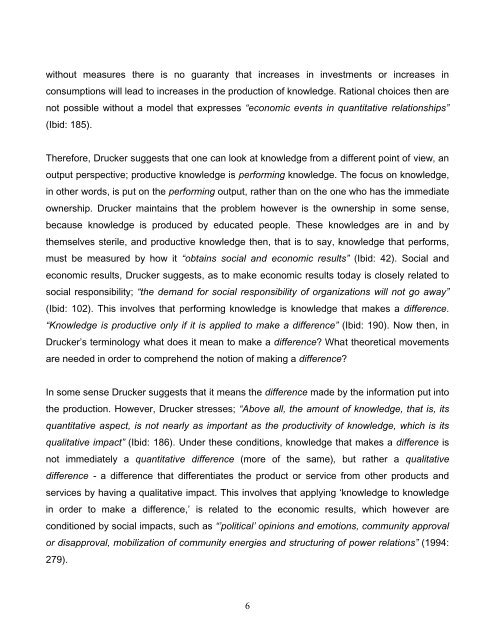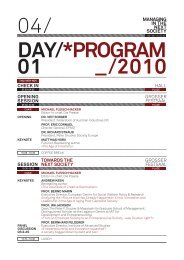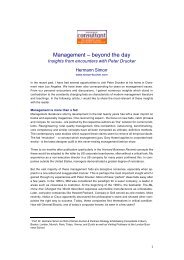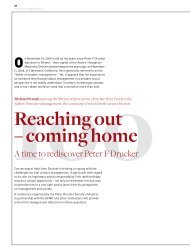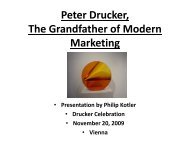From Industrial Capitalism to Taylorian Late Capitalism
From Industrial Capitalism to Taylorian Late Capitalism
From Industrial Capitalism to Taylorian Late Capitalism
You also want an ePaper? Increase the reach of your titles
YUMPU automatically turns print PDFs into web optimized ePapers that Google loves.
without measures there is no guaranty that increases in investments or increases in<br />
consumptions will lead <strong>to</strong> increases in the production of knowledge. Rational choices then are<br />
not possible without a model that expresses “economic events in quantitative relationships”<br />
(Ibid: 185).<br />
Therefore, Drucker suggests that one can look at knowledge from a different point of view, an<br />
output perspective; productive knowledge is performing knowledge. The focus on knowledge,<br />
in other words, is put on the performing output, rather than on the one who has the immediate<br />
ownership. Drucker maintains that the problem however is the ownership in some sense,<br />
because knowledge is produced by educated people. These knowledges are in and by<br />
themselves sterile, and productive knowledge then, that is <strong>to</strong> say, knowledge that performs,<br />
must be measured by how it “obtains social and economic results” (Ibid: 42). Social and<br />
economic results, Drucker suggests, as <strong>to</strong> make economic results <strong>to</strong>day is closely related <strong>to</strong><br />
social responsibility; “the demand for social responsibility of organizations will not go away”<br />
(Ibid: 102). This involves that performing knowledge is knowledge that makes a difference.<br />
“Knowledge is productive only if it is applied <strong>to</strong> make a difference” (Ibid: 190). Now then, in<br />
Drucker’s terminology what does it mean <strong>to</strong> make a difference? What theoretical movements<br />
are needed in order <strong>to</strong> comprehend the notion of making a difference?<br />
In some sense Drucker suggests that it means the difference made by the information put in<strong>to</strong><br />
the production. However, Drucker stresses; “Above all, the amount of knowledge, that is, its<br />
quantitative aspect, is not nearly as important as the productivity of knowledge, which is its<br />
qualitative impact” (Ibid: 186). Under these conditions, knowledge that makes a difference is<br />
not immediately a quantitative difference (more of the same), but rather a qualitative<br />
difference - a difference that differentiates the product or service from other products and<br />
services by having a qualitative impact. This involves that applying ‘knowledge <strong>to</strong> knowledge<br />
in order <strong>to</strong> make a difference,’ is related <strong>to</strong> the economic results, which however are<br />
conditioned by social impacts, such as “’political’ opinions and emotions, community approval<br />
or disapproval, mobilization of community energies and structuring of power relations” (1994:<br />
279).<br />
6


